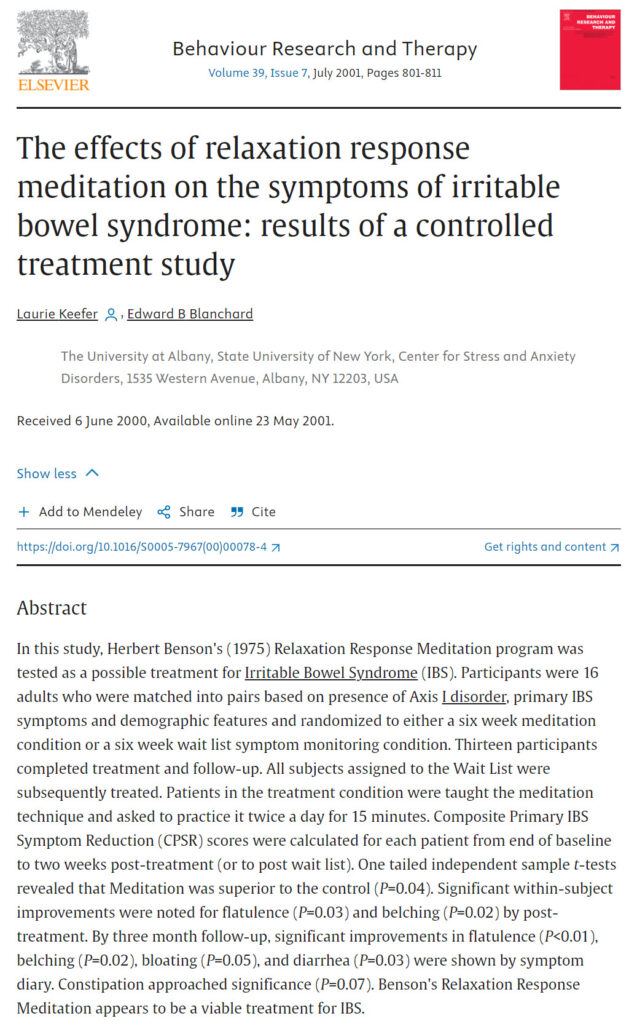In this study, Herbert Benson’s (1975) Relaxation Response Meditation program was tested as a possible treatment for Irritable Bowel Syndrome (IBS). Participants were 16 adults who were matched into pairs based on presence of Axis I disorder, primary IBS symptoms and demographic features and randomized to either a six week meditation condition or a six week wait list symptom monitoring condition. Thirteen participants completed treatment and follow-up. All subjects assigned to the Wait List were subsequently treated. Patients in the treatment condition were taught the meditation technique and asked to practice it twice a day for 15 minutes. Composite Primary IBS Symptom Reduction (CPSR) scores were calculated for each patient from end of baseline to two weeks post-treatment (or to post wait list). One tailed independent sample t-tests revealed that Meditation was superior to the control (P=0.04). Significant within-subject improvements were noted for flatulence (P=0.03) and belching (P=0.02) by post-treatment. By three month follow-up, significant improvements in flatulence (P<0.01), belching (P=0.02), bloating (P=0.05), and diarrhea (P=0.03) were shown by symptom diary. Constipation approached significance (P=0.07). Benson’s Relaxation Response Meditation appears to be a viable treatment for IBS.
The effects of relaxation response meditation on the symptoms of irritable bowel syndrome: results of a controlled treatment study
Publication
Behavior Research and Therapy
39(7):801-11
Abstract
Web and Email Links
Related Listings
Journal
Minn Med.
Although the physiological and biochemical changes that occur during the acute stress response have been well-characterized, the contrasting changes that underlie the relaxation response evoked by various mind-body techniques are less understood. To help guide future mind-body research, we present a conceptual model that integrates patterns of change at the physiological and molecular levels. In addition, we point to future research opportunities and discuss how repeated elicitation o […]
Journal
Annals of the New York Academy of Sciences
A wakeful hypometabolic state accompanies the practice of a relaxational, meditation technique called Transcendental Meditation. The state is characterized by decreased oxygen consumption, carbon dioxide elimination, respiratory rate and minute ventilation, with no change in respiratory quotient. Arterial blood pH and base excess decrease slightly while arterial blood lactate markedly decreases. Systolic, diastolic, and mean arterial blood pressures remain unchanged. The electroenceph […]
Journal
Behavioral Medicine
The authors compared characteristics of 1,012 outpatients completing a 10-week behavioral medicine intervention with 300 outpatients who dropped out. They administered the Symptom Checklist-90 Revised (SCL-90R) before and after the program. Patients who completed the treatment, compared with dropouts, tended to be more highly educated, married, and gainfully employed. Their pretreatment scores on the SCL-90R were significantly lower than those of the dropouts on somatization, depressi […]

